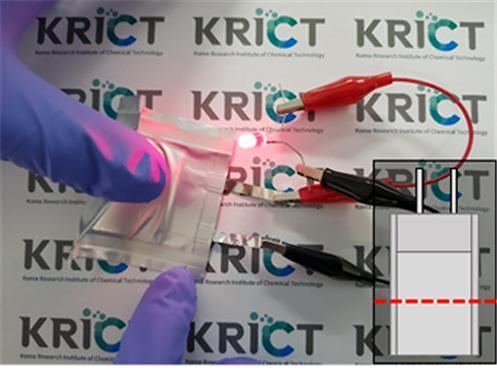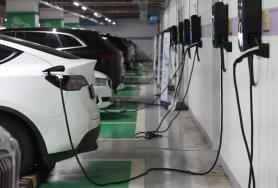
[Courtesy of the Korea Research Institute of Chemical Technology]
All-solid-state batteries can have a higher energy density than lithium-ion batteries. Solid-state batteries enable faster charging, higher voltage and longer cycle life. Solid-state electrolytes are non-flammable and ensure the safe operation of lithium metal batteries. However, challenges to widespread adoption include energy and power density, durability, material costs, sensitivity and stability.
Solid polymer electrolytes developed so far had several obstacles to be commercialized, such as low lithium-ion conductivity at ambient temperature. It is also difficult to form a stable state in which ions can be smoothly transferred through an interface where it meets electrolytes.
The Korea Research Institute of Chemical Technology (KRICT) said that its research team has developed a highly stable solid-state polymer battery technology. A solid polymer electrolyte with the excellent conductivity and flexibility of lithium ions was developed by designing ion-conductive polymer plasticizers to be connected to each other in the form of a net.
"We hope to contribute to solving energy and climate change problems and foster national technological competitiveness through cooperation with related companies to secure original technologies for all-solid-state batteries," KRICT head Yi Mi-hye said in a statement on February 25.
Through joint research with Energyn, the institute said it would solve problems in the manufacturing process to realize the commercialization of solid-state batteries, citing the enormous growth potential and economic ripple effects of highly stable batteries.
Battery suppliers are trying to develop cheaper, more efficient, and more powerful batteries. Compared to flammable liquid electrolytes, solid-state batteries have a lower risk of catching fire. Fewer safety systems are needed, further increasing energy density. German auto giant Volkswagen has unveiled a massive push to reduce the cost of producing batteries and eventually switch to solid-state technology.
In September 2021, LGES, the battery-making wing of South Korea's LG Group developed innovative technologies that can advance the commercialization of all-solid-state batteries that use composite-type solid electrolytes, using micro-sized silicon particles which are comparatively cheap and easy to use.
South Korea's Hyundai has vowed to seek the pilot production of electric vehicles installed with solid-state batteries in 2025. In October 2021, Hyundai partnered with Factorial Energy, a U.S. solid-state cell technology developer, to develop all-solid-state batteries.
Copyright ⓒ Aju Press All rights reserved.


![[K-Tech] Samsung SDI battery powers electric vehicle to Guinness World Record](https://image.ajunews.com/content/image/2025/08/07/20250807091903656890_278_163.jpg)

